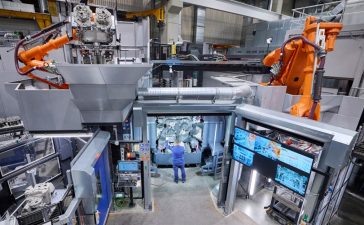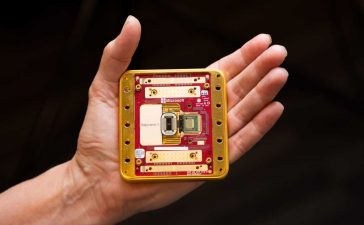In the seven years since it opened, The Bradfield Centre at the heart of Cambridge Science Park has carved out a reputation as a thriving tech hub – and a great place to visit.
Owned by Trinity College and operated by Mantle Space, the striking building is renowned not only for the successes of those companies that call it home, but for a lively programme of events that bring people from all over the Cambridge region through its doors.
“The mission is to provide scale-up space for tech start-ups,” says managing director James Parton. “The reason we do it is to see companies grow and become successful. When you look around and the place is packed and buzzing and you have a diversity of people, you know you’ve created a melting pot. Those are the two things that make us proud.”
The Bradfield Centre features 40,000 square feet of space, but only about three-quarters of that is let to tenants. The café, auditorium and collaboration spaces are critical parts of the building’s appeal.
“The building was purposefully designed to encourage collaboration between people,” says James. “We maintained a lot of open space. It was the right decision to forego the potential revenue generation from a space like the auditorium to support the community.
mpu1
“It was always a big part of the original vision not only to provide services for members but an asset for the wider community to utilise.”
If you’re connected to the tech community in Cambridge, there is every chance you have visited the site even if your company is not based there.
“We’ve hosted well over 1,000 events and we estimate more than 35,000 have been to them,” continues James.
“Ninety per cent of the events we host in the auditorium are free of charge because we are committed to supporting the grass-roots tech community in Cambridge.
“Not-for-profit meet-up groups are the lifeblood of the tech community in Cambridge and we don’t charge them for the hire of the space. We want them to have a home in a tech environment with a built-in audience to help them grow too.
“It wasn’t unusual to have three events per day before Covid. That went down to zero overnight and it’s taken a good 18 months to come back. Since the turn of the year, we’ve got four or five regular meet-ups back, which is great.”
Among these is the Software Crafters Cambridge meet-up, the Amazon Web Services Cambridge user group and The Marketing Meetup organised by Joe Glover.
mpu2
These meet-ups can be attended by members and non-members alike, adding to the mix of those coming into The Bradfield Centre.
It is home to 123 companies, with nearly 800 employees, and only a fraction are university spin-outs.
“We represent quite a diverse membership and a lot of people are coming from outside Cambridge into The Bradfield. If you’re a university spin-out, you would probably start at ideaSpace. As you raise more money and grow, you might come to The Bradfield two or three years later. The average age of companies here is about seven years. They are on the path to scaling. That’s what we see as our role – taking companies from six or seven people to 50, 60.
“A lot of the growth is organic, with members growing their existing office space within the building. We’re always moving things around. We plan for around 90 per cent occupancy as we need a bit of headroom. There is always an interesting capacity challenge!”
External data suggests current Bradfield Centre members have raised around $300million, although with not all funding announced publicly, that figure is probably an underestimate.
Morse Micro, an Australian-headquartered fabless semiconductor company working on wifi technology for the Internet of Things, raised $140m in 2022. And Gearset, which provides a Salesforce DevOps platform, raised $55m in the same year.
Gearset is by far The Bradfield Centre’s largest employer, with nearly 200 employees. A finalist in next month’s Cambridge Independent Science and Technology Awards, Gearset describes itself as Cambridge’s fastest-growing scale-up.
University spin-out Nyobolt, which provides high-power batteries with ultra-fast charging times, is another Bradfield Centre success story, having raised $10m while based there in 2021. It went on to raise a further $59m in 2022, and is now based at Evolution Business Park in Impington.
Another form of success was enjoyed by Spectral Edge, which was acquired by Apple in December 2019, having developed software for mobile phones that fuses multiple versions of a photograph together to improve image quality.
“Our membership mix is representative of what you would expect in Cambridge, given that we don’t have lab space,” says James.
Software as a service is the leading tech sector among The Bradfield Centre’s members. Medtech and biotech – typically on the machine learning / AI side – is also represented, along with web development, Internet of Things, gaming and more.
“It makes for an interesting community,” says James. “There are lots of interactions and collaborations.”
Days before we talk, Bradfield Centre member Cambridge Future Tech – a technology venture builder that is another finalist in our awards next month – began productive discussions with another company on site after hearing them talking.
“There was a serendipitous collision, which happens all the time,” says James. “There definitely is an advantage of being clustered together, but there’s not a science to it. It’s spontaneous.”
It is one of the reasons why there is still a filter on the membership at The Bradfield Centre.
“We turn away a lot of companies who don’t meet the tech criteria,” James reveals.
But in common with all the workplaces operated by Mantle Space in and around Cambridge, The Bradfield Centre has a varied offer for tenants.
“When Mantle Space took up operation of The Bradfield Centre, we introduced a virtual membership, which stood us in good stead during Covid,” notes James. “Some companies, certainly at the earlier stages, are still working fully remotely but having a Science Park address is valuable.
“The Home-Flexi product is essentially a co-working product for people coming in a couple of days a week. Then we offer permanent desks and private offices, which start at three people.”
Mantle Space – sponsor of Software Company of the Year at the Science and Technology Awards – also operates The Officers’ Mess at Duxford and at Nine Hills Road and 95 Regent Street in Cambridge, among other sites.
James says there is something unique about The Bradfield Centre.
“When I look back over the last five or six years, it is this hybrid model, where we have one foot inside the university ecosystem and one foot out, that is the root of our success,” he suggests.
“Because Trinity owns the building, that gives The Bradfield a seat at the table in university conversations. We’re seen as part of the fabric of the university even though technically we’re not a university building.
“We don’t carry the university badge. But through the relationship with Trinity, we’re part of the inner circle, with offers like The Trinity Bradfield Prize that have helped to reinforce our commitment and support for entrepreneurship within the university.
“At the same time, we have one foot out. As a commercial operator, we can operate with agility and we understand the market, both in the city and region. It gives us commercial acumen along with the advantages of being part of the university network as well. It’s the best of both worlds.”
For members, The Bradfield is able to call on a broad network of expertise and support.
“80 per cent of companies need some sort of help,” says James. “In priority order, that is talent, business development and funding. We have put together a roster of partners we can bring in. None of these is a commercial relationship – we don’t get paid for introductions. Transparency and neutrality are very important.
“Since we’ve opened, a significant development has been our partnership with Barclays Eagle Labs. We are part of the network and this is now classed as an Eagle Lab. Partnering with them gives us access to their entire network.
“We work with Growth Works and the Growth Hub, another avenue for business support. We work closely with Innovate UK, especially on the grant funding side. We have relationships with all the tech providers, in terms of support, credits and funding. We work with all the service providers – law firms, venture capital firms, accountants. We also work with Cambridge Angels and we are an angel hub for the UK Business Angels Association.
“There are so many offers for entrepreneurship support – I counted 40 programmes running at the University of Cambridge. So we don’t need to add more into the mix. My focus is on how we promote and support those programmes, rather than duplicating them.
“We have built a really good relationship with The Entrepreneurship Centre at Cambridge Judge Business School. They opened an office here during the pandemic and they’ve continued to run Enterprise Tech from The Bradfield Centre.”
The Bradfield also supports student entrepreneurship through its flagship programme, The Trinity Bradfield Prize.
“It’s been going five years now. We’ve had nearly 400 teams apply. We’ve awarded £90,000 in cash prizes with no strings attached,” says James.
Winners get a mix of mentorship, workshops and training and it has helped previous companies like food waste recycling pioneer Vuala make real progress. Vuala – another Science and Technology Awards finalist – has already trialled its innovative system at The Bradfield.
But James stresses that members at The Bradfield Centre benefit from more than just business support.
“The pandemic reinforced how there is a big social element to what we are doing within the building,” he says. “It’s so easy for tech companies to work remotely, but we’re seeing that founders are always thinking about reasons why people should come into the office.
“Things like the activities we offer, the café and the social experience are a big reason to come into the office.
“Some people don’t have a home environment conducive to working. Eating, sleeping and working in the same room all day isn’t good for anyone. For those who can work from home, we are coming up with reasons to come in, which is good for the individual, the team and company culture.”
One of the attractions for those coming into work is the atmosphere.
“We are open to the general public, anyone can walk in,” notes James. “We have always tried to have that open, inclusive, welcoming culture and atmosphere, whereas the majority of places are membership only.”
The café’s food and drink offer is a major draw for people around the wider Science Park and beyond.
“There is diversity here – you could have someone like a VC sitting in here. Then we have dog walkers, or people bringing kids in, especially in half-term. I love it. It makes for such a stimulating environment. It’s creative, rather than stuffy. Everyone talks about the buzz that the building has and I think it’s those elements that make it feel different. It’s an eclectic mix,” says James.
You might spot the Cambridge Independent’s very own business correspondent, Mike Scialom, and his dog, Tilly, working from The Bradfield Centre on some days.
“Having dogs in the building makes it feel friendly and welcoming,” says James.
It adds up to a real deep tech success story, which will no doubt be reflected when the final report is written on its role as part of the government’s University Enterprise Zones (UEZ) pilot.
“We’ve managed to run it profitably for Trinity, so it’s been a good business but it’s also good for membership. The competition is relentless and there are competitors coming in all the time. Nothing stands still, we can’t ever get complacent,” says James.
“But it’s always down to the people. The building is spectacular – it’s a beautiful place to work – but without the people to encourage creativity, build the atmosphere, do the social side, it would be nothing. It’s very hard to create a culture and atmosphere and that’s where we put the focus and the effort.”
Playing a role in the wider community
The Bradfield Centre has increasingly been working on its broader role in the community, working with a range of partners.
“In the last 12 to 18 months, we’ve started to focus on our role in Cambridge,” says James.
Among those it is working with are coding academy Tech Educators, from Norwich.
“What makes them different is they have relationships with the Combined Authority, meaning they have 30 fully-funded places. Their recruitment and marketing is targeted at people who haven’t gone through a traditional education path and haven’t been to university. They might be trying to break into tech, or be reskilling mid-career. We are their Cambridge campus and their graduations are in the auditorium.”
Meanwhile, Curious Clubhouse from Inspire 2 Ignite is providing alternative provision for kids struggling with mainstream schools.
“They have created a programme themed around entrepreneurship – taking responsibility for your own destiny. We love that and it fits so well with the ethos of The Bradfield,” explains James.
“Once a week they come here to be immersed in an entrepreneurial environment. We are all aware of the wealth gap in the city. The kids they work with benefit from that aspiration. There’s nothing stopping you starting your own business.”
The Bradfield Centre also supports Cambridge Pride and backed the Cambridge Half Marathon, and family charity The Red Hen Project also works on site.
It is taking environmental responsibility seriously too, with 100 per cent renewable energy, eliminating all plastic in the café and achieving BREEAM certification for sustainability. Even the coffee beans on site, from Kickstart Coffee, raise money to support schools in Uganda.
“We are taking the sustainability side really seriously,” says James.
Supporting the Cambridge Independent Science and Technology Awards 2024
Mantle Space, operator of The Bradfield Centre, is sponsoring Software Company of the Year at the 2024 Cambridge Independent Science and Technology Awards, taking place on 16 May at Hinxton Hall Conference Centre. Finalists get two free tickets each.
A limited number of additional tickets are on sale for the awards, which feature a networking reception with leading lights from science and tech.
Visit Eventbrite to buy tickets and see the full list of finalists hoping to win on the night.












